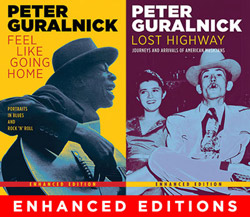 On Sunday, The New York Times published a story on noted music historian Peter Guralnick. The author of books on soul, country and blues, and the definitive biographies of Elvis Presley and Sam Cooke, has recently undertaken a project to upgrade some of the books in his oeuvre to "enhanced" e-books. Seven books, including Feel Like Going Home and Lost Highway, as well as the Presley and Cooke biographies, will be reissued to include additional content, including audio and video. Some of the content for the first two — Feel Like Going Home and Lost Highway — is archival interview footage originally shot by Mr. Guralnick, and some will be new footage from new interview sessions.
On Sunday, The New York Times published a story on noted music historian Peter Guralnick. The author of books on soul, country and blues, and the definitive biographies of Elvis Presley and Sam Cooke, has recently undertaken a project to upgrade some of the books in his oeuvre to "enhanced" e-books. Seven books, including Feel Like Going Home and Lost Highway, as well as the Presley and Cooke biographies, will be reissued to include additional content, including audio and video. Some of the content for the first two — Feel Like Going Home and Lost Highway — is archival interview footage originally shot by Mr. Guralnick, and some will be new footage from new interview sessions.
It will be interesting to see what roadblocks lie in wait. Cost, certainly, is one such question. Audio and video content will need to be licensed from publishers, labels, etc. and its usage remains to be seen. Price to the consumer will also be a factor: that $10 book you read for curiosity won’t be so attractive at $40 or more. “The rights situation is only going to get more complicated as things go on and people realize they can make more money,” one editor is quoted as saying in the Times story.
Further, how much of that additional content do you own when you buy the enhanced e-book? Can the user access the audio content for use after they finish the book, or is it available only during the enhanced reading experience? Let’s say you read a book to learn more about an artist. You love the book, but love the music within even more. Are you then required to go download, and presumably pay for that same content again?
Will there be a “perception problem,” putting the integrity of the author and book at stake. Will publishers, labels and, perhaps more importantly, artist estates make available such “officially sanctioned content” to a book that portrays the artist (or even song) in question, if it is not shown in a favorable light? Will consumers view such collaborations as less than the “real, unvarnished” story? As the Times story points out, “in some cases, Mr. Guralnick’s relationship with subjects of his books became so close that he felt he had to swear off writing further about them because ‘I didn’t want the challenge of either writing truthfully or maintaining my friendship, so I chose friendship.”
It is a potentially fascinating glimpse into the future of publishing, but let’s not sound the death knell for traditional books just yet. Remember, the CD signaled the same demise for the LP. Of course, vinyl is not only still alive, but is trending upwards (along with digital downloads, of course) while it is CDs that are trending downward. As a friend of mine in the manufacturing end once told me, “People who care about artwork and sound quality buy LPs; people who care about portability and instant gratification buy digital downloads. Where does that leave the CD?”
I love multimedia. E-books are great for travel, be it subway, plane or train. Interactive DVDs are fun…for awhile. But admit it; when you buy that CD with the “bonus” DVD, before too long you’re just listening to the audio only on that DVD, aren’t you? And it's hard to imagine a bookshelf full of "enhanced" e-books that you return to time and again.
Sometimes there’s nothing better than curling up with a good old-fashioned book. You know, the one with pages…
What are your thoughts?
You can check out more info at Mr. Guralnick's website here.
- AMB Blog's blog
- Log in or register to post comments
